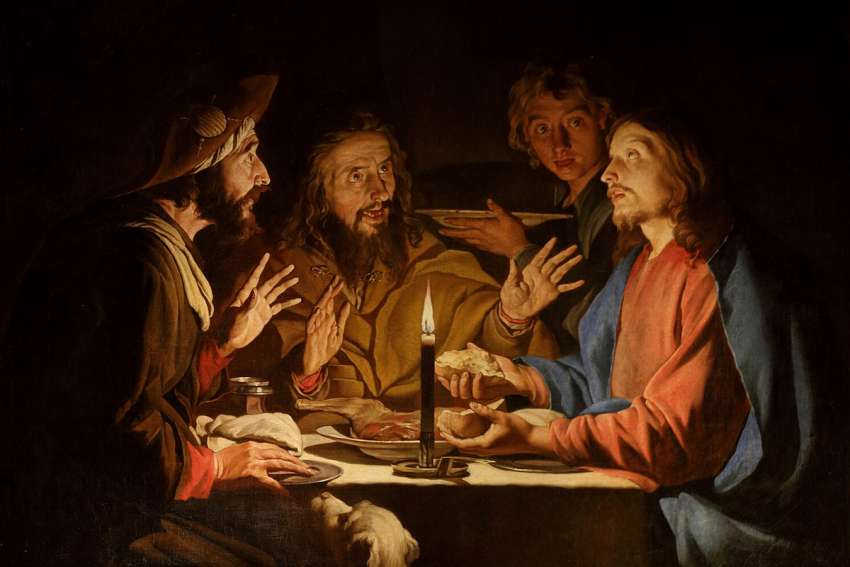Third Sunday of Easter (Year B) April 14 (Acts 3:13-15, 17-19; Psalm 4; 1 John 2:1-5; Luke 24:35-48)
Peter had jarring news for those gathered around him. In their view, Jesus was a renegade and had died a disgraceful death. The whole matter should have ended there, but God had other plans. The God of Abraham, Isaac and Jacob — the God of all Israel — had raised Jesus up and glorified Him.
God's Word on Sunday: God has given us a haunting challenge
By Fr. Scott Lewis, S.JSecond Sunday of Easter (Year B) , April 7 (Acts 4:32-35; Psalm 118; 1 John 5:1-6; John 20:19-31)
“There was not a needy person among them” — this was the source of their unity and their strength. They were of one heart and soul.
Good Samaritans make every moment matter
By Fr. Yaw AcheampongOn one cold evening, I made my usual visit to the hospital chapel to reflect on the day’s events in my ministry. It was a challenging day full of visits with questions about faith, life, and death. I was called to support a couple of bereaved families.
God's Word on Sunday: My God and your God, my Father and your Father
By Fr. Scott Lewis, S.JResurrection of the Lord (Year B) March 31 (Acts 10:34a, 37-43; Psalm 118; Colossians 3:1-4; John 20:1-18)
The early followers of Jesus burned with the desire to communicate what they had seen, heard and experienced. If they were from the second or third generations of believers, they were able to rely on the testimony of those who had gone before them.
Easter makes Christ’s real presence tangible
By Mary MarroccoAs we can readily observe, it’s not Good Friday that needs to be proclaimed to the world but Easter Sunday. We all know about suffering, death and violence; no evidence is required. But the good news needs to be made known: that forgiveness has trumped cruelty, love has triumphed over death and the apparent victory of evil has become a tool in God’s hand to give us life eternal. Evil is revealed to be like smoke that vanishes in the breeze or wax that melts in the fire (Psalm 96).
God's Word on Sunday: Nothing is lost giving everything to God
By Fr. Scott Lewis, S.JPassion (Palm) Sunday (Year B) March 24 (Isaiah 50:4-7; Psalm 22; Philippians 2: 6-11; Mark 14:1-15:47)
The prophet Isaiah has given us a perfect job description of one who walks with God and can legitimately claim to speak for the Lord. The description is easily distinguished from typical human behaviour and attitudes by what is noticeably missing: ego and self-seeking. This individual becomes an instrument in God’s hands and a conduit for God’s words and intentions.
Recognition, honour, respect
By Bishop Thomas Dowd, Catholic Register SpecialI first heard about Holy Cross Mission in Wiikwemkoong not long after I became Bishop of the Diocese of Sault Ste. Marie. My first official visit to the Mission was to celebrate confirmations and to bless a new altar.
God's Word on Sunday: God is deep within our heart and soul
By Fr. Scott Lewis, S.JFifth Sunday of Lent (Year B) March 17 (Jeremiah 31:31-34; Psalm 51; Hebrews 5:7-9; John 12:20-33)
Treaties, contracts and covenants are always in need of updating. Conditions and people change, and the longer an agreement remains in force, the more frayed at the edges it becomes. The older version is not put through the shredder — it forms the basis of the new agreement and can be considered its continuation.
God's Word on Sunday: A time of reckoning is time for renewal
By Fr. Scott Lewis, S.JFourth Sunday of Lent (Year B) March 10 (2 Chronicles 36:14-17a, 19-23; Psalm 137; Ephesians 2:4-10; John 3:14-21)
Why had God allowed Jerusalem to be destroyed and the people to be driven into exile? The author of Chronicles was attempting to make sense of the devastation and ruin that had befallen his land and people. There was more than enough blame to go around. Both the priests and the people had fallen into corruption and pollution of the worst sort. In the eyes of the author, things like this do not just happen — there is always a cause, and most of the time the cause is human in origin.
A sacrament to recognize God’s healing love
By Fr. Yaw AcheampongKnown by different names over the centuries — “anointing of the sick,” “extreme unction” and “last rites” — it was administered only at the point of death. The Church now teaches it “is not a sacrament intended only for those who are at the point of death. Hence, it is certain that as soon as any of the faithful begins to be in danger of death from sickness or old age, this is already a suitable time for them to receive this sacrament.”
God's Word on Sunday: There can be no substitute for God
By Fr. Scott Lewis, S.JThird Sunday of Lent (Year B) March 3 (Exodus 20:1-17; Psalm 19; 1 Corinthians 1:18, 22-25; John 2:13-25)
Many people do not know quite what to do with the Decalogue, aka the Ten Commandments. Some want to toss it out the window as irrelevant and outdated. Others will salute it and insist on its importance. Conservative “family values” politicians sometimes use it as a club to beat society, but when cornered, they are often unable to explain — or sometimes even to name — all 10 of the commandments.











